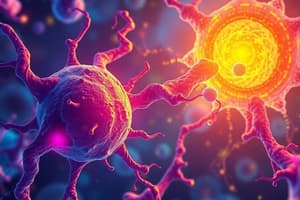Podcast
Questions and Answers
What is the role of research assistants in cell biology?
What is the role of research assistants in cell biology?
- Designing and analyzing cellular imaging techniques
- Running ELISA tests and PCR assays
- Performing experiments and maintaining laboratory equipment (correct)
- Developing new biological devices and systems
Which area of active research in cell biology involves examining individual cells to understand their diversity?
Which area of active research in cell biology involves examining individual cells to understand their diversity?
- Cellular imaging
- Single-cell analysis (correct)
- Synthetic biology
- Three-dimensional cell culture
What aspect of cell biology involves developing more physiologically relevant models of cell behavior?
What aspect of cell biology involves developing more physiologically relevant models of cell behavior?
- Synthetic biology
- Three-dimensional cell culture (correct)
- Single-cell analysis
- Cellular imaging
In cell biology research, what do research assistants do with respect to writing?
In cell biology research, what do research assistants do with respect to writing?
Which technique in cell biology focuses on physical principles like microfluidics or atomic force microscopy?
Which technique in cell biology focuses on physical principles like microfluidics or atomic force microscopy?
Flashcards are hidden until you start studying
Study Notes
Cell Biology: The Nanoscale World of Life
Cell biology is a cornerstone of the life sciences, focusing on the fundamental processes within individual cells and the interactions between them. At the heart of life itself, cell biology illuminates the intricate molecular dance that sustains us.
Cellular Components and Functions
Cells are the building blocks of living organisms, each one enclosed within a membrane that separates its internal environment from the external world. The contents of a cell include:
- DNA: The genetic material, containing the instructions for life.
- Proteins: Molecules with diverse functions, from enzymes to structural components.
- Organelles: Specialized compartments performing specific tasks, such as the mitochondria or the ribosomes.
Cells are in constant communication with each other, forming a complex network of interactions.
Techniques and Methods
Cell biology relies on advanced techniques to visualize and manipulate cells at the molecular scale. Some techniques include:
- Fluorescence microscopy: Visualizing cells and their constituents using fluorescent markers to highlight specific features.
- Confocal microscopy: Producing three-dimensional images of cells by selectively detecting fluorescent signals.
- Electron microscopy: Providing detailed images of cells and their components using high-energy electrons.
- Live-cell imaging: Observing cells as they perform their daily tasks in real time.
- Biophysical techniques: Studying cells and their components using physical principles, such as microfluidics or atomic force microscopy.
Research Assistants and Cell Biology
Research assistants play a crucial role in cell biology, working alongside more experienced scientists on challenging, complex projects. They may perform tasks such as:
- Assisting with experiments and maintaining laboratory equipment.
- Collecting, organizing, and analyzing data.
- Preparing and running assays, such as ELISA tests or polymerase chain reaction (PCR).
- Writing reports, grant proposals, and manuscripts.
- Presenting research findings at conferences and meetings.
Current Challenges and Opportunities
Cell biology is continually evolving to address new questions and tackle emerging challenges. Some areas of active research include:
- Synthetic biology: Designing and constructing new biological devices and systems.
- Single-cell analysis: Examining individual cells to understand their molecular and functional diversity.
- Three-dimensional cell culture: Developing more physiologically relevant models of cell behavior.
- Cellular imaging: Improving techniques and developing new tools for visualizing cellular structures and processes.
Conclusion
Cell biology is a broad and dynamic field, offering valuable insights into the fundamental workings of life. As we continue to learn more about the molecular basis of cellular processes, cell biology will remain at the forefront of scientific discovery.
Studying That Suits You
Use AI to generate personalized quizzes and flashcards to suit your learning preferences.




